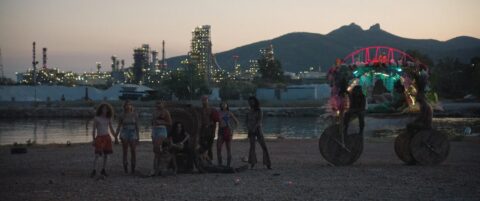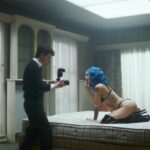One of the most infuriating disappointments of the festival so far, Evi Kalogiropoulou’s Gorgonà (2025) feels like a retro-futurist dystopian action movie dreamed up by a 15-year-old incel gamer whose idea of lesbians comes straight from 4chan threads.
The plot follows two women (Melissanthi Mahut and Aurora Marion) rising up — and hate-sexing each other — to Fight the Power™ in a petrol-fueled city-state ruled by steroid-addled assholes wearing more eyeliner than your fiercest neighbourhood goth. But don’t mistake these women for actual characters. The film treats them mainly as eye candy. This central romance is clumsy, cringe-inducing and rarely compelling.
Vulgar and garish, the movie is utterly hollow — no emotional depth, no real feeling. It sinks to the same silly, shallow pool as another film exploring similar terrain, Jessica Forever (Caroline Poggi, Jonathan Vinel, 2018), which is to say, it never even dips its toes. Faux-feminist at its core, this is easily the most irritating queer empowerment attempt since Burhan Qurbani’s No Beast So Fierce (2025).
The film’s flirtation with fascist aesthetics is impossible to ignore. It wallows in the language of dominance: especially with its endless parade of perfectly sculpted bodies doing sexy macho training stuff. Everyone looks like they’ve stepped off a bodybuilding stage stylised by Ed Hardy or 90s-era Dave Navarro — symmetrical, sharp-featured and glistening as if dipped in sexy goth oil. Power is endlessly fetishised.
And the violence — especially against women — is so relentless and matter-of-fact it blends into the wallpaper. You have to wonder: is this a critique, or just indulgence? The line blurs when the form seduces as much as it exposes. As someone who’s seen more than their share of woman-led revenge films, I get the mechanics: suffering precedes catharsis. But here, there’s no one to root for. No character is drawn with enough depth to make the revenge matter.
There’s a history here — artists and filmmakers have long used fascist imagery to comment on authoritarianism. Paul Verhoeven’s Starship Troopers (1997) is a prime example: sharp satire disguised as bombastic action, endlessly misread by right-wing morons. This film tries to occupy the same ambiguous space, adopting fascist symbols and bodies to hold them up for inspection.
But here’s the catch: fascist aesthetics are seductive by design. They appeal to our craving for order, strength and surface beauty. When a film leans so heavily into muscular bodies, eroticised violence, and women reduced to collateral damage — even with critical intent — it risks becoming what it claims to criticise. Unless the film’s self-awareness is woven deeply into its fabric, the critique gets swallowed by the spectacle. Some will claim the film’s mix of dead-seriousness and tackiness is intentional camp or tongue-in-cheek comic book shlock. It’s not. It’s trashy exploitation.
I get what it’s aiming for. The politics are nominally in the right place: a broken society, fascists in power, the marginalised forced to rise up and resist (while looking hot, naturally). But the execution is so simple-minded it veers into parody within the first reel… and never finds its footing again. There are flickers of something more in the world-building, and some of Giorgos Valsamis’ cinematography stands out, aiming for a heightened, grotesque vision of authoritarian neon-blight. But even that grows tiresome quickly. Annapurna Sriram’s Fucktoys (2025) handled a similar vision of societal collapse with far more style and substance.
Near the end, there’s a moment that teases a Showgirls-style (Verhoeven, 1995) Nomi Malone beatdown — a badass woman rolling up to a villain’s luxury villa ready to deliver sweet justice. Spoiler: it doesn’t happen. If you’re into movies where men grope barely dressed women and beat them senseless, Gorgonà might be your thing. These scenes pile up with almost no payoff, even with only 15 minutes left. By the time the finale rolls around, you’re watching a stylish blur of one-dimensional characters trudge toward an inevitable woke climax (don’t get me wrong, j’adore woke, but it feels unearned here).
Gorgonà fits into a new wave of queer cinema that mixes mythology or literary texts — like No Beast So Fierce or Gala de Sol’s Rains Over Babel (2025), an overstuffed, overstylised riff on Dante’s Divine Comedy (1321). The problem is they all get so caught up in neon sets and aesthetic excess that the humans depicted become a complete afterthought.
Editor-at-large Jared loves movies and lives with Kiki in Berlin.




